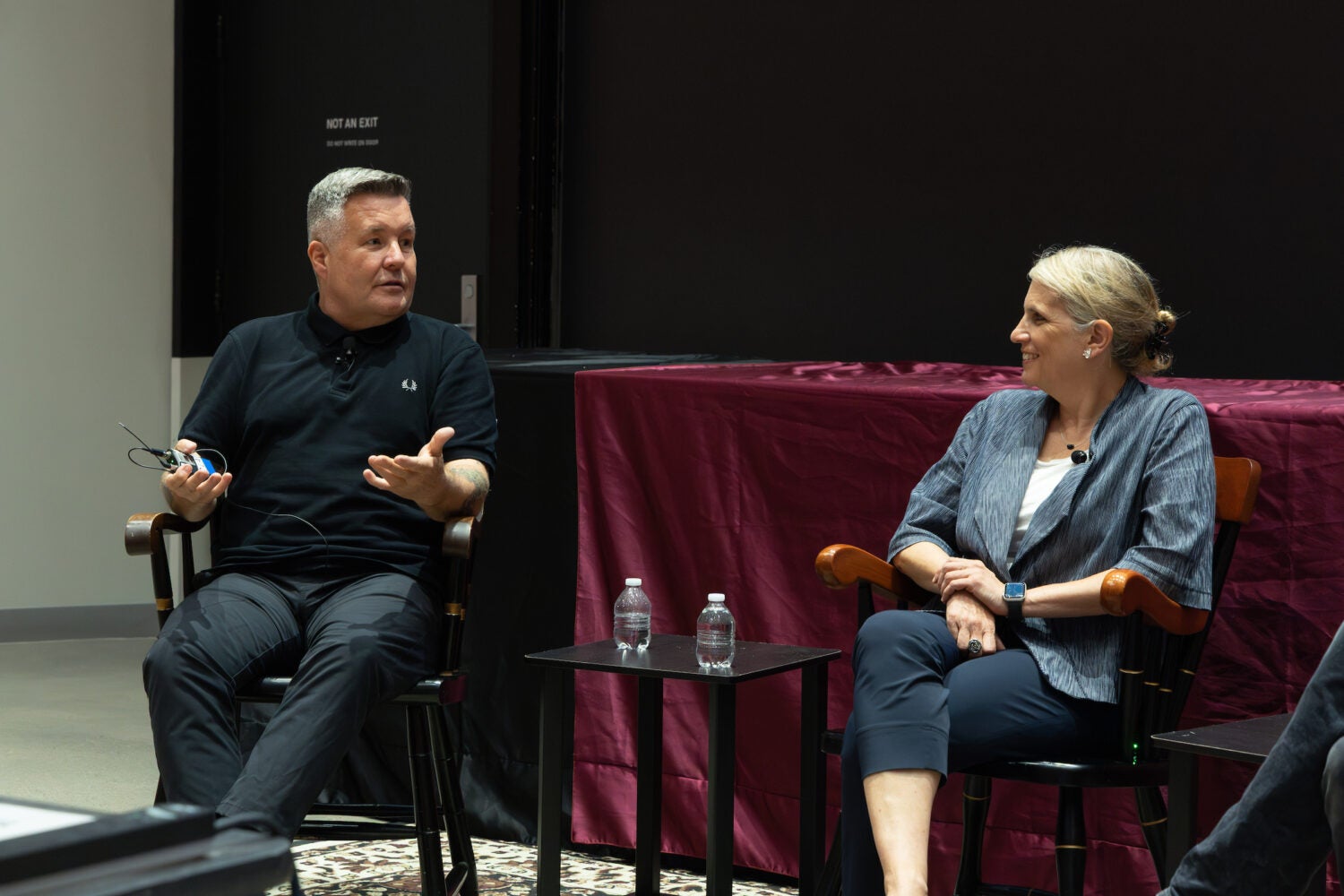Dropkick Murphys frontman Ken Casey doesn’t teach at Harvard, and Harvard Law School Professor of Practice Sharon Block doesn’t perform punk rock. But as champions of working peoples’ rights, they have a lot in common.
They recently found mutual ground in an on-campus taping of the podcast “Sing for Science,” which matches prominent musicians with scientists or scholars, diving into issues raised by an artist’s songs. (Past episodes have found David Byrne discussing eels, and Jonathan Davis of the death-metal band Korn talking with a mortuary scientist.) The current episode, whose release is pending, took off from the current Dropkick Murphys single “Who’ll Stand With Us?”— a song whose theme supporting labor organizing resonates with Block’s work as head of the Center for Labor and a Just Economy at the Law School.
Legendary locally for their raucous St. Patrick’s Day shows, Boston’s Dropkick Murphys have grown more outspoken about social issues in recent years. Podcast host Matt Whyte screened a viral video where Casey convinces an audience member to exchange his MAGA T-shirt and hat, both made in Nicaragua, for a U.S.-made Dropkick Murphys shirt.
“I’ve had some conversations with fans that didn’t go so smooth,” Casey admitted afterward. He explained that his favorite musical genres — punk rock, Irish traditional, and populist folk by Woody Guthrie — are all essentially protest music. “I’ll always think of the painting that Woody had on his guitar, ‘This machine kills fascists.’ That theory is that a song can do way more than a bullet or a physical confrontation ever can, because they can spread far and wide and have a message that carries.”
Block seconded Casey’s admiration for Guthrie and fellow folk icon Pete Seeger, and noted that Seeger was brave enough to record the song “Talking Union” in the 1940s. “Very few artists actually talk union anymore,” she said. “One thing I think about a lot is getting the idea of the importance of the labor movement into the bloodstream of popular culture, and [making it] something that people actually think about and talk about. At this point the percentage of people in unions is so low in this country, we’re below 10 percent now. People just don’t have any personal experience: They’re not in unions, they don’t have family members in unions, and they don’t hear popular performers talking about it.”
Casey noted the conservative swing that he’s seen in parts of his own fanbase. “I’ll say wait: You used to agree with everything I said and now all of a sudden I’m a commie? If you think about a strike, in the old days you’d have strikebreakers, [and] the goon squad come to break it up. You don’t need to do that now. You just vilify the unions in the public sphere via social media. Maybe people will be mad that another worker is making $5 more than them. Don’t begrudge them that. We should all be [asking] why someone else is making millions in a stock buyback. It all comes down to divide and conquer.”
When Whyte asked if he was hoping to bring about class solidarity through his music, Casey shot back, “If anyone in a band tells you that they think they can help achieve that, they’re a little full of themselves. But it’s got to be everyone doing their part to swing the pendulum back — to say ‘Why is it that we’re so divided, and the wealth gap keeps getting greater and greater?’”

He said he not only has faced some fan backlash, but even occasional death threats because of the economic and political statements he has made, yet he remains undeterred. “I don’t want it to be that America went down while I had a platform, and I didn’t choose to use it,” he said. “I was raised, as a descendant of immigrants, by people who taught me that your job is always to have a hand out to help the next person in line behind you. That’s what I do and it’s what I sing about. To say that we should all have a fair wage, we should all be kind to each other — that’s apparently radical now.”
Asked what constitutes a fair wage, Block replied “I’ll tell you what it isn’t, $7.25 an hour” — naming the federal minimum wage that was enacted through support by her former boss, Sen. Ted Kennedy, more than 16 years ago.
One audience member asked why so many working people have switched their loyalties from the left to the right politically. “I’ve seen it firsthand,” Casey said. “The majority of labor unions are made up of white males. And they took the bait that the Trump administration dangled in front of them, to say ‘Get mad at these [other] people.’ ”
Block agreed but went a step further: “It doesn’t give me joy to say this. I’ve spent most of my career in Democratic political jobs. But I feel that the Democratic Party has let down working people. We didn’t do enough to deliver on promises that we made.”
Asked what people can do to effect change that supports workers, Block suggested showing up for rallies and protests, including those Casey performs at. “Politicians can do at least one thing, which is count votes. If they see that people in this country don’t think what is happening is OK, then maybe they will get the backbone to tell this president. I hope people come because they care and want to make their voices heard, but if they come for the Dropkick Murphys, that’s OK too.”
To this Casey agreed: “Come for the music. Maybe stay for the message.”
Want to stay up to date with Harvard Law Today? Sign up for our weekly newsletter.
